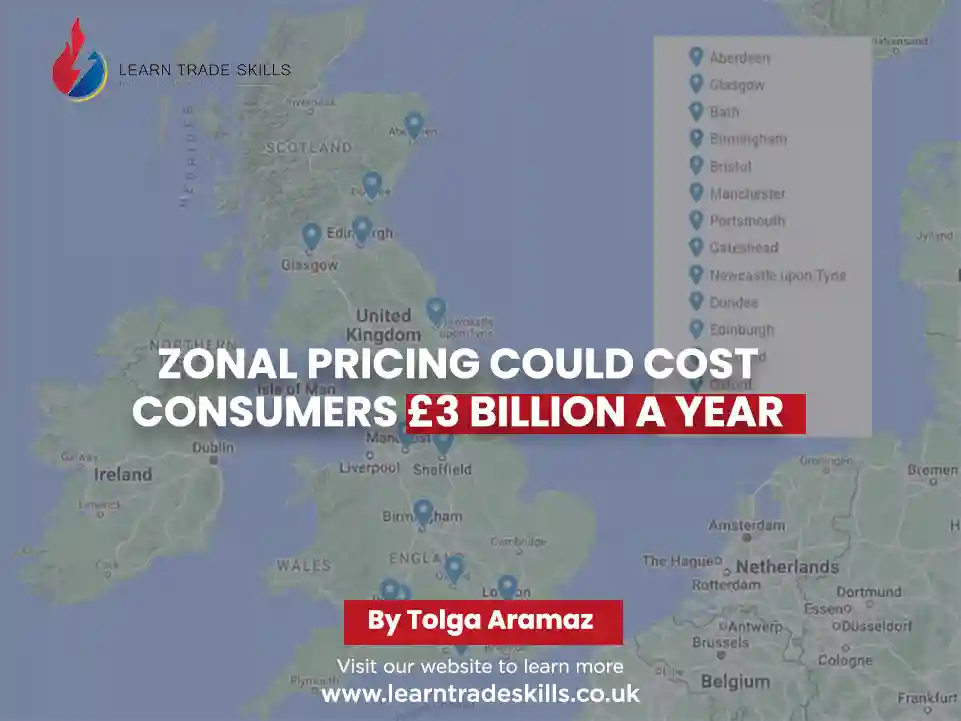

The UK government is considering a major change in how electricity is priced—one that could increase consumer bills by up to £3 billion a year and reshape the landscape for renewable energy investment. But what does this mean for those entering the electrical trade today? More importantly, how can future electricians prepare for the changes this policy might bring?
As someone involved in training the next generation of electricians, I believe it’s vital that we not only follow the headlines but also understand the implications behind them. Let’s explore what zonal pricing is, why it’s controversial, and how it may affect the future of our industry.
Zonal pricing means that electricity prices vary by region, depending on local supply and demand. For example, electricity in northern Scotland might be priced differently from electricity in London or Birmingham. While the idea is to improve efficiency by reflecting the true cost of delivering electricity, it also introduces new financial complexities.
This model is currently being promoted by some energy leaders, notably Greg Jackson, CEO of Octopus Energy. The theory is that regional pricing can reduce waste, optimize the grid, and encourage local energy production. But independent research from the UK Energy Research Centre (UKERC) warns that the practical outcomes could be damaging if implemented too soon.
As a trainee or apprentice, you might think this is all policy jargon that doesn’t apply to you—but it does. Here’s why:
If zonal pricing is rushed, renewable energy projects—especially wind farms in Scotland and northern England—may be delayed or cancelled. That means fewer installation, maintenance, and commissioning jobs in those areas. Instead, projects might shift south, requiring relocation or travel for work.
As electricians, understanding how the grid operates regionally will become essential. Skills in working with distributed generation (e.g., solar, battery storage), smart meters, and load balancing will be in high demand. This change emphasizes the need for up-to-date training on modern grid technologies.
As costs rise for the end-user, there may be pressure to complete work faster or cheaper. Ethical, well-trained electricians will be essential to ensuring quality isn’t compromised. You’ll be expected to explain the value of your work to cost-conscious clients—and to do it in a language they understand.
UKERC’s research estimates that if zonal pricing goes ahead before major transmission upgrades, the resulting investor uncertainty will cause renewable developers to increase their asking price for government subsidies. This could drive up strike prices—the guaranteed price developers are paid for their electricity—by £20 per MWh. That increase alone could add £3 billion annually to consumer bills.
More than just economics, this decision could delay the UK’s transition to clean energy—pushing back targets like Clean Power 2030, a key milestone on the path to net zero.
Before zonal pricing can work, we need:
This is where vocational training becomes crucial. Our sector needs to produce electricians who are adaptable, technically sharp, and grid-aware.
To all aspiring electricians: This is your moment. The energy sector is undergoing one of the biggest transformations in decades. Whether you’re fitting solar panels in Cornwall or maintaining wind turbines in the Highlands, your skills will shape the UK’s clean energy future.
To fellow educators and training providers: Let’s update our curriculum, double down on green energy modules, and prepare our learners for a grid that’s smarter, more local, and more dynamic.
Zonal pricing could either help modernize our electricity market—or become an expensive detour. Either way, it will reshape the job landscape for electricians. At Learn Trade Skills, we’re committed to preparing our students for that future with practical, future-focused training.
Because in the end, the grid isn’t just wires and transformers. It’s a network of skilled hands—yours—building the next era of energy.
Sources
UK Energy Research Centre (UKERC) Report: This comprehensive study examines the potential impacts of introducing zonal pricing in the British electricity market, highlighting concerns about increased consumer costs and investment risks in renewable energy projects
Related Article
£1.66 Trillion Investment Powers the Future of Electrical Training
Blackhillock’s 200MW Battery Energy Storage System: A Game-Changer for UK’s Renewable Grid
Tolga Aramaz is the Director of Learn Trade Skills (LTS), a family-run training centre specialising in electrical installations. With years of experience and a deep understanding of the electrical industry, Tolga is known for their exceptional organisational skills, attention to detail, and commitment to delivering outstanding results. They provide valuable insights and guidance to electricians, contractors, and businesses, ensuring compliance with industry regulations and safety protocols. Through engaging training programmes and consultancy services, Tolga empowers professionals to excel in their roles, fostering long-term relationships built on professionalism and customer satisfaction.



© Copyright Learn Trade Skills 2025
“Lorem ipsum dolor sit amet, consectetur adipiscing elit. Ut pretium tristique purus nec consectetur. Nulla feugiat eget tellus aliquam scelerisque. Sed eget luctus enim, sed mattis enim. Lorem ipsum dolor sit amet, consectetur adipiscing elit. Ut pretium tristique purus nec consectetur. Nulla feugiat eget tellus aliquam scelerisque. Sed eget luctus enim, sed mattis enim.Nulla feugiat eget tellus aliquam scelerisque. Sed eget luctus enim, sed mattis enim. Lorem ipsum dolor sit amet, consectetur adipiscing elit. Ut pretium tristique purus nec consectetur. Nulla feugiat eget tellus aliquam scelerisque. Sed eget luctus enim, sed mattis enim.”
William Goss
Electrician course
11/11/2024